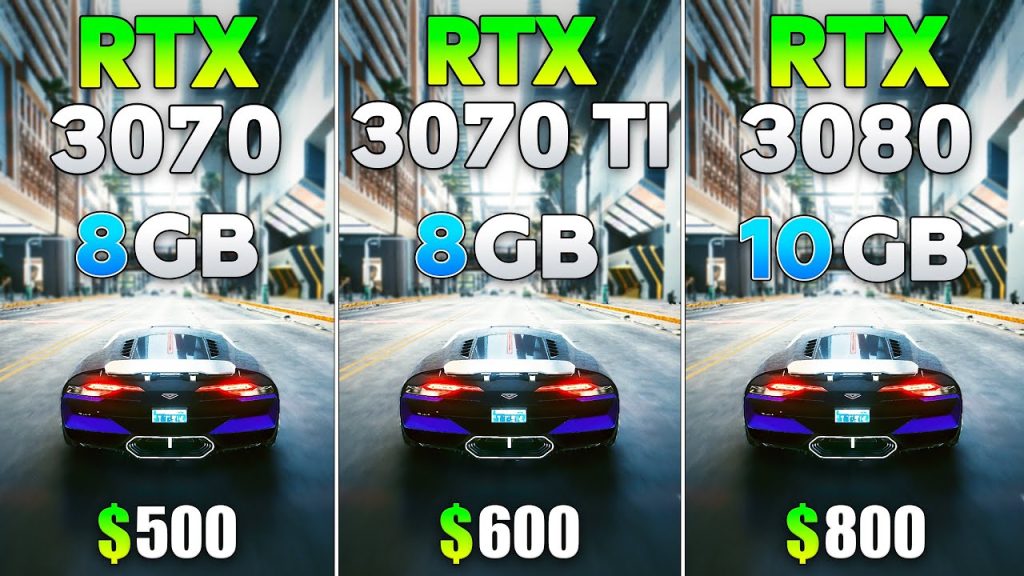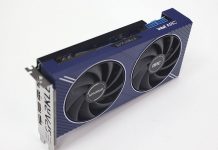Nvidia 3070 Ti vs. 3080: A Comprehensive Comparison
In the world of gaming and content creation, the battle for the ultimate graphics card supremacy rages on. Nvidia, a leader in the GPU industry, offers two powerful contenders: the Nvidia GeForce RTX 3070 Ti and the Nvidia GeForce RTX 3080. Choosing between these two titans can be a daunting task, but fear not; we’re here to provide you with a comprehensive comparison to help you make an informed decision.

I. Introduction
Selecting the right GPU is crucial for an optimal gaming or content creation experience. When it comes to Nvidia’s offerings, the GeForce RTX 3070 Ti and the GeForce RTX 3080 stand out as top choices among enthusiasts. In this article, we’ll dive deep into the technical specifications, gaming performance, and content creation capabilities of these GPUs to help you decide which one suits your needs best.
Are you ready to embark on a journey through the world of high-performance graphics cards? Let’s get started!
II. Technical Specifications
Before we delve into the nitty-gritty details, let’s take a bird’s-eye view of the technical specifications of the Nvidia GeForce RTX 3070 Ti and the Nvidia GeForce RTX 3080.
Nvidia GeForce RTX 3070 Ti
- GPU Architecture: Ampere
- CUDA Cores: 6144
- Base Clock: 1575 MHz
- Boost Clock: 1770 MHz
- VRAM: 8GB GDDR6X
- Memory Bus Width: 256-bit
- Ray Tracing and Tensor Cores: Yes
- TDP (Thermal Design Power): 290W
Nvidia GeForce RTX 3080
- GPU Architecture: Ampere
- CUDA Cores: 8704
- Base Clock: 1440 MHz
- Boost Clock: 1710 MHz
- VRAM: 10GB GDDR6X
- Memory Bus Width: 320-bit
- Ray Tracing and Tensor Cores: Yes
- TDP (Thermal Design Power): 320W
Now that we have a basic understanding of their specifications, let’s dive deeper into the comparison to see how these numbers translate into real-world performance.
III. Gaming Performance
When it comes to gaming, performance is paramount. Gamers crave smooth, lag-free experiences with breathtaking visuals. Let’s explore how the Nvidia GeForce RTX 3070 Ti and the Nvidia GeForce RTX 3080 fare in this department.
Frame Rates in Popular Games
Both the 3070 Ti and the 3080 deliver exceptional frame rates in today’s demanding titles. Games like “Cyberpunk 2077,” “Red Dead Redemption 2,” and “Call of Duty: Warzone” run smoothly on both cards. However, the RTX 3080 often takes the lead, providing slightly higher frame rates, especially at 4K resolutions.
Ray Tracing Capabilities
Ray tracing technology is the holy grail of gaming visuals, creating lifelike lighting, reflections, and shadows. Both GPUs support ray tracing, but the 3080’s additional CUDA cores give it the edge. If you crave the best ray tracing experience, the 3080 is your go-to choice.
4K Gaming Performance
For gamers who demand 4K resolution and maximum details, the Nvidia RTX 3080 shines. It effortlessly handles 4K gaming, offering higher frame rates and superior image quality compared to the 3070 Ti. If 4K gaming is non-negotiable, the 3080 is the clear winner.
Overclocking Potential
Enthusiasts who love to push their hardware to the limit will appreciate the overclocking potential of both GPUs. However, the RTX 3080, with its larger CUDA core count and higher power limit, has more headroom for overclocking. It can achieve even better performance gains when tweaked.
Real-World Gaming Experiences
Numbers only tell part of the story. Real-world gaming experiences matter most. Gamers using the 3070 Ti will enjoy superb performance at 1440p and good performance at 4K, while the 3080 elevates gaming to a new level with consistently high frame rates at 4K.
In conclusion, both the Nvidia GeForce RTX 3070 Ti and the Nvidia GeForce RTX 3080 offer outstanding gaming performance, but the 3080 emerges as the champion for those who demand 4K gaming excellence and the highest ray tracing quality. If you’re primarily a gamer, the 3080 may be worth the extra investment.
IV. Content Creation and Productivity
While gaming prowess is essential for many users, creative professionals and content creators require GPUs that excel in tasks like video editing, 3D rendering, streaming, and software development. Let’s see how the Nvidia GeForce RTX 3070 Ti and the Nvidia GeForce RTX 3080 stack up in these areas.
Video Editing
Video editing demands significant computing power, especially when working with high-resolution footage. Both GPUs perform admirably in video editing tasks, but the RTX 3080’s additional CUDA cores and VRAM give it an advantage when handling complex projects with 4K or higher resolution videos. If video editing is a major part of your workflow, the 3080 may save you valuable time.
3D Rendering
Content creators in industries like animation and architectural design often rely on 3D rendering. The RTX 3080’s higher CUDA core count and VRAM provide a significant boost in rendering speed compared to the 3070 Ti. This can lead to quicker project turnaround times, making the 3080 a preferable choice for professionals.
Streaming
For streamers who combine gaming and content creation, both GPUs are more than capable. However, the RTX 3080’s extra power allows for smoother streaming with higher encoding settings, ensuring top-notch quality for your viewers. If you’re serious about streaming, the 3080 offers a competitive edge.
Software Development
Software developers often need to compile large codebases efficiently. Here, both GPUs perform well, but the 3080’s superior processing capabilities can lead to faster compile times. Additionally, if you engage in GPU-intensive tasks related to AI or machine learning development, the 3080’s higher CUDA core count is a significant asset.
In summary, the Nvidia GeForce RTX 3080 outperforms the 3070 Ti in content creation and productivity tasks, making it the preferred choice for creative professionals and those who need their GPU to handle demanding workloads. However, if your primary focus is gaming with occasional content creation, the 3070 Ti still offers impressive performance.
V. Price and Availability
As important as performance is, your budget and the availability of these GPUs can significantly impact your decision. Let’s examine the pricing and availability landscape for the Nvidia GeForce RTX 3070 Ti and the Nvidia GeForce RTX 3080.
Evaluation of Price Points
The price of these GPUs can vary widely depending on factors such as manufacturer, custom cooling solutions, and regional demand. Generally, the RTX 3070 Ti is more budget-friendly, making it an attractive option for gamers and content creators looking for excellent value.
On the other hand, the RTX 3080 often comes with a premium price tag due to its superior performance and features. If you’re willing to invest in top-tier performance, the 3080 may be within your budget.
Discussing Availability Issues
One of the significant challenges in the GPU market has been availability. Both the 3070 Ti and the 3080 have faced supply shortages and high demand, leading to inflated prices on the secondary market. It’s crucial to monitor availability and consider purchasing from reputable sources to avoid scams or overpriced units.
Market Fluctuations
GPU prices can fluctuate frequently, influenced by factors like cryptocurrency mining trends and global supply chain issues. Staying informed about market trends and setting price alerts can help you secure a good deal when the opportunity arises.
Budget Constraints and Value for Money
Your budget plays a pivotal role in your decision-making process. Consider your financial limitations and whether the performance gains of the RTX 3080 justify the higher cost. For many users, the RTX 3070 Ti offers an excellent balance between performance and affordability.
In conclusion, the pricing and availability landscape for the Nvidia GeForce RTX 3070 Ti and the Nvidia GeForce RTX 3080 is dynamic and can vary significantly over time. It’s essential to weigh your budget against your performance requirements and keep a close eye on market trends to make a well-informed purchase.
VI. Power Efficiency and Cooling
The performance of a GPU is not the only factor to consider. Power efficiency, cooling solutions, and overall user experience also play crucial roles in your decision between the Nvidia GeForce RTX 3070 Ti and the Nvidia GeForce RTX 3080.
Analysis of Power Consumption and Efficiency
Efficiency matters, especially if you’re conscious of power usage and heat generation. The RTX 3070 Ti, with its lower TDP (Thermal Design Power) of 290W, is more power-efficient compared to the RTX 3080’s 320W TDP. This can result in lower electricity bills and less heat output in your system.
Cooling Solutions and Thermal Performance
Both GPUs come with various cooling solutions, depending on the manufacturer and model. It’s essential to research and choose a card with an effective cooler. Efficient cooling not only ensures lower temperatures but also contributes to better performance and longevity. Custom cooling solutions can vary, so check reviews and benchmarks to find the best option for your needs.
Noise Levels and Fan Behavior
The noise levels generated by your GPU can impact your overall gaming and working experience. While both GPUs aim for quieter operation, the RTX 3070 Ti often runs quieter due to its lower power consumption. However, this can vary depending on the specific card and cooling solution you choose.
Overall User Experience
A smooth and enjoyable user experience is what every PC enthusiast desires. It’s important to consider factors such as driver stability, software support, and customer service. Nvidia has a strong track record in these areas, ensuring that both the 3070 Ti and 3080 offer a reliable and hassle-free user experience.
In summary, the Nvidia GeForce RTX 3070 Ti is the more power-efficient option, leading to lower power consumption and potentially quieter operation. However, the cooling solution and noise levels can vary among different card models. Be sure to research and choose a card that aligns with your preferences and requirements.
VII. Ray Tracing and DLSS (Deep Learning Super Sampling)
In recent years, ray tracing and DLSS (Deep Learning Super Sampling) have revolutionized gaming visuals, offering a level of realism and immersion previously unattainable. Let’s delve into these technologies and how they influence the Nvidia GeForce RTX 3070 Ti and the Nvidia GeForce RTX 3080.
Delving into Ray Tracing Technology
Ray tracing is a rendering technique that simulates the behaviour of light in a virtual environment. It creates stunning, lifelike visuals by accurately modelling the reflection, refraction, and scattering of light. Both the 3070 Ti and the 3080 support ray tracing, but the 3080, with its higher CUDA core count, offers an edge in ray tracing performance. This results in smoother and more detailed lighting effects in games that support the technology.
The Significance of DLSS
DLSS, or Deep Learning Super Sampling, is an AI-powered feature that uses machine learning to upscale lower-resolution images in real time. It allows gamers to enjoy higher frame rates without sacrificing image quality. The RTX 3070 Ti and the RTX 3080 both support DLSS, enhancing gaming performance without compromising on visual fidelity.
Impact on Gaming Visuals
Ray tracing and DLSS have a profound impact on gaming visuals. With ray tracing, you’ll experience realistic reflections, shadows, and global illumination, elevating your gaming experience to a new level. DLSS, on the other hand, allows you to maintain high frame rates, even at higher resolutions, ensuring smooth gameplay without the need for expensive hardware.
It’s worth noting that while both GPUs support these technologies, the RTX 3080 provides a more immersive ray-tracing experience due to its superior hardware capabilities. If you’re a gamer who craves the best in visual fidelity, the 3080 is the clear choice.
VIII. Future-Proofing
Investing in a high-end GPU is a long-term commitment, and you want to ensure that your choice remains relevant as technology evolves. Let’s explore the concept of future-proofing and whether the Nvidia GeForce RTX 3070 Ti or the Nvidia GeForce RTX 3080 is better equipped for the challenges of tomorrow.
Longevity of These GPUs
Both the 3070 Ti and the 3080 are powerful GPUs capable of handling current gaming and content creation demands with ease. However, when it comes to future-proofing, it’s essential to consider their relative performance.
The Nvidia GeForce RTX 3080, with its higher CUDA core count, larger VRAM, and overall superior specifications, is better positioned to handle upcoming games and software updates. This means it’s more likely to remain relevant and provide excellent performance for a more extended period.
Upcoming Games and Software
As game developers continue to push the boundaries of graphics and realism, it’s reasonable to assume that future titles will become more demanding. Titles with advanced ray tracing, higher resolutions, and more complex AI-driven features will benefit from the extra power the RTX 3080 offers.
If you’re an enthusiast who wants to enjoy upcoming blockbuster games at their highest settings and resolution, the Nvidia GeForce RTX 3080 is the GPU that offers the most assurance of handling these future challenges.
Compare 3070 ti vs 3080
Here is a comparison of the RTX 3070 Ti and the RTX 3080:
| Feature | RTX 3070 Ti | RTX 3080 |
|---|---|---|
| GPU | GA102-200 | GA102-300 |
| CUDA cores | 6144 | 8704 |
| Tensor cores | 192 | 272 |
| RT cores | 48 | 68 |
| Memory | 8GB GDDR6 | 10GB GDDR6X |
| Memory bus | 256-bit | 320-bit |
| Boost clock | 1770 MHz | 1710 MHz |
| TDP | 290W | 320W |
| Price | $700 | $900 |
As you can see, the RTX 3080 has more CUDA cores, Tensor cores, RT cores, memory, and memory bandwidth than the RTX 3070 Ti. It also has a higher TDP, but the performance difference between the two cards is not that significant.
In most games, the RTX 3080 is about 10-15% faster than the RTX 3070 Ti. However, the difference is smaller at lower resolutions and with less demanding games.
If you are looking for the absolute best performance, then the RTX 3080 is the better card. However, the RTX 3070 Ti is still a great card and it offers a better value for money.
Which card is right for you?
That depends on your needs and budget. If you are looking for the best possible performance in demanding games, then the RTX 3080 is a worthwhile upgrade. However, if you are happy with the performance of your RTX 3070 Ti, then there is no need to upgrade.
Here are some factors to consider when making your decision:
- Your current resolution and refresh rate: If you are playing games at 1080p or 1440p, then the RTX 3070 Ti is still a capable card. However, if you are playing games at 4K or 144Hz, then the RTX 3080 will give you a significant performance boost.
- Your budget: The RTX 3080 is more expensive than the RTX 3070 Ti. If you are on a tight budget, then the RTX 3070 Ti is a better value.
- Your other components: If you have a weak CPU or other components, then you may not see a significant performance improvement with the RTX 3080.
If you decide to upgrade from the RTX 3070 Ti to the RTX 3080, you will need to make sure that your PC has the necessary power supply and cooling capacity.
FAQs
We understand that choosing between the Nvidia GeForce RTX 3070 Ti and the Nvidia GeForce RTX 3080 can be a daunting task, and you may have specific questions in mind. Here, we’ve compiled a list of frequently asked questions to address your concerns and provide expert answers.
Q1: Which GPU is better for 4K gaming?
A: While both GPUs are capable of 4K gaming, the Nvidia GeForce RTX 3080 offers superior performance and is better suited for a smooth 4K gaming experience, especially in demanding titles.
Q2: Can the 3070 Ti handle ray tracing well?
A: Yes, the 3070 Ti can handle ray tracing, but for the best ray tracing experience with high frame rates, the 3080 is the preferred choice due to its higher CUDA core count.
Q3: Is the 3080 worth the extra cost over the 3070 Ti?
A: The value of the 3080 depends on your needs. If you prioritize top-tier gaming performance and plan to use ray tracing extensively, the 3080 justifies the extra cost. However, the 3070 Ti offers excellent value for those on a budget.
Q4: What are the ideal system requirements for these GPUs?
A: Both GPUs require a PCIe x16 slot, adequate power supply, and compatible drivers. Ensure your system meets these requirements, and consider adequate cooling for optimal performance.
Q5: How do these GPUs compare to AMD alternatives?
A: Nvidia’s RTX 3070 Ti and RTX 3080 have strong competition from AMD’s offerings. It’s essential to compare benchmarks and consider your specific needs to make the right choice between Nvidia and AMD.
Q6: Are there any known issues or driver concerns with these GPUs?
A: Nvidia regularly releases driver updates to address issues and improve performance. Staying up to date with the latest drivers is recommended to ensure a smooth experience.
Q7: Do I need a high-end PSU for the 3080?
A: Yes, the 3080 has a higher TDP, so a high-quality PSU with sufficient wattage and the necessary power connectors is essential to power the GPU effectively.
Q8: Can I use these GPUs for cryptocurrency mining?
A: Yes, both GPUs are capable of cryptocurrency mining, but factors like power consumption, mining algorithm, and ROI should be considered when deciding on a GPU for mining.
Q9: Which GPU offers better overclocking potential?
A: The Nvidia GeForce RTX 3080 has more overclocking potential due to its larger CUDA core count and higher power limit. Overclocking enthusiasts may find it to be the better choice.
Q10: What are the warranty and customer support options for Nvidia GPUs?
A: Nvidia GPUs typically come with a manufacturer’s warranty, and customer support options vary depending on the manufacturer. It’s advisable to check the warranty and support policies of the specific card you plan to purchase.
With these expert answers to common questions, we hope to provide clarity and guidance in your decision-making process. If you have more specific queries or require further information, feel free to reach out to Nvidia or the GPU manufacturer for additional support.
X. Conclusion
In this comprehensive comparison, we’ve explored the technical specifications, gaming performance, content creation capabilities, pricing, power efficiency, and future-proofing aspects of the Nvidia GeForce RTX 3070 Ti and the Nvidia GeForce RTX 3080. Both GPUs offer exceptional performance, but the choice ultimately depends on your specific needs and budget.




